Logs (Java)
Data Description
The Logs event is used in SAP to view log data from the Java NetWeaver systems. Six types of log file are supported:
Portal Activity: These logs are generated by SAP Enterprise Portal systems
Default Trace: These logs are generated by SAP Netweaver AS systems
Application: These logs are generated by SAP Netweaver AS systems
Config Changes: These logs are generated by SAP Netweaver AS systems
Security: These logs are generated by SAP Netweaver AS systems
Security Audit: These logs are generated by SAP Netweaver AS systems
Potential Use Cases
This event could be used in the following scenarios:
Alert on specific errors in the default trace log.
Visualize user activity in the Enterprise Portal system.
View specific application logs.
Alert on suspicious user activity.
Correlate configuration changes to performance issues.
PowerConnect Administrative Console Configuration
Important: These settings should not be changed without first consulting support.
Log into the PowerConnect administrative console via the following URL (http://<serverhost>:<port>/webdynpro/resources/com.powerconnect5/spcj_wd/SapPowerConnectJava#). Then click on the Log Monitoring tab.
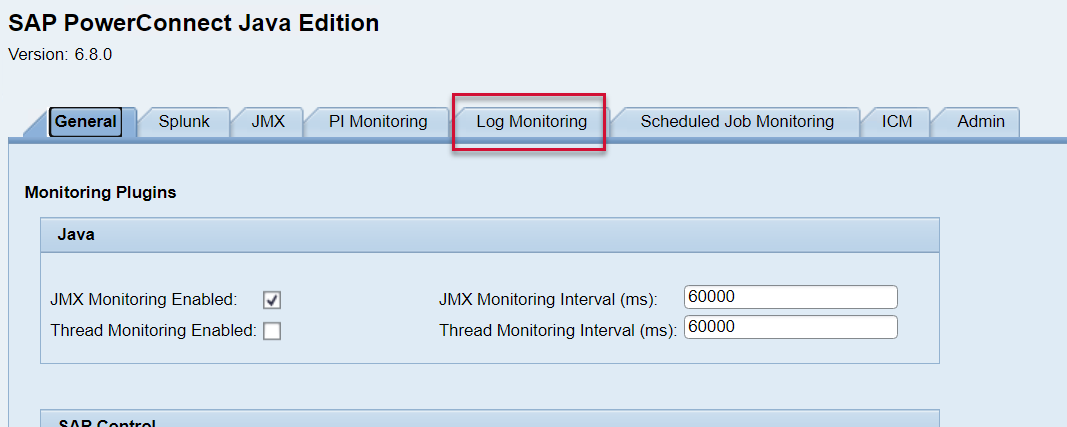
The screen will look like this:
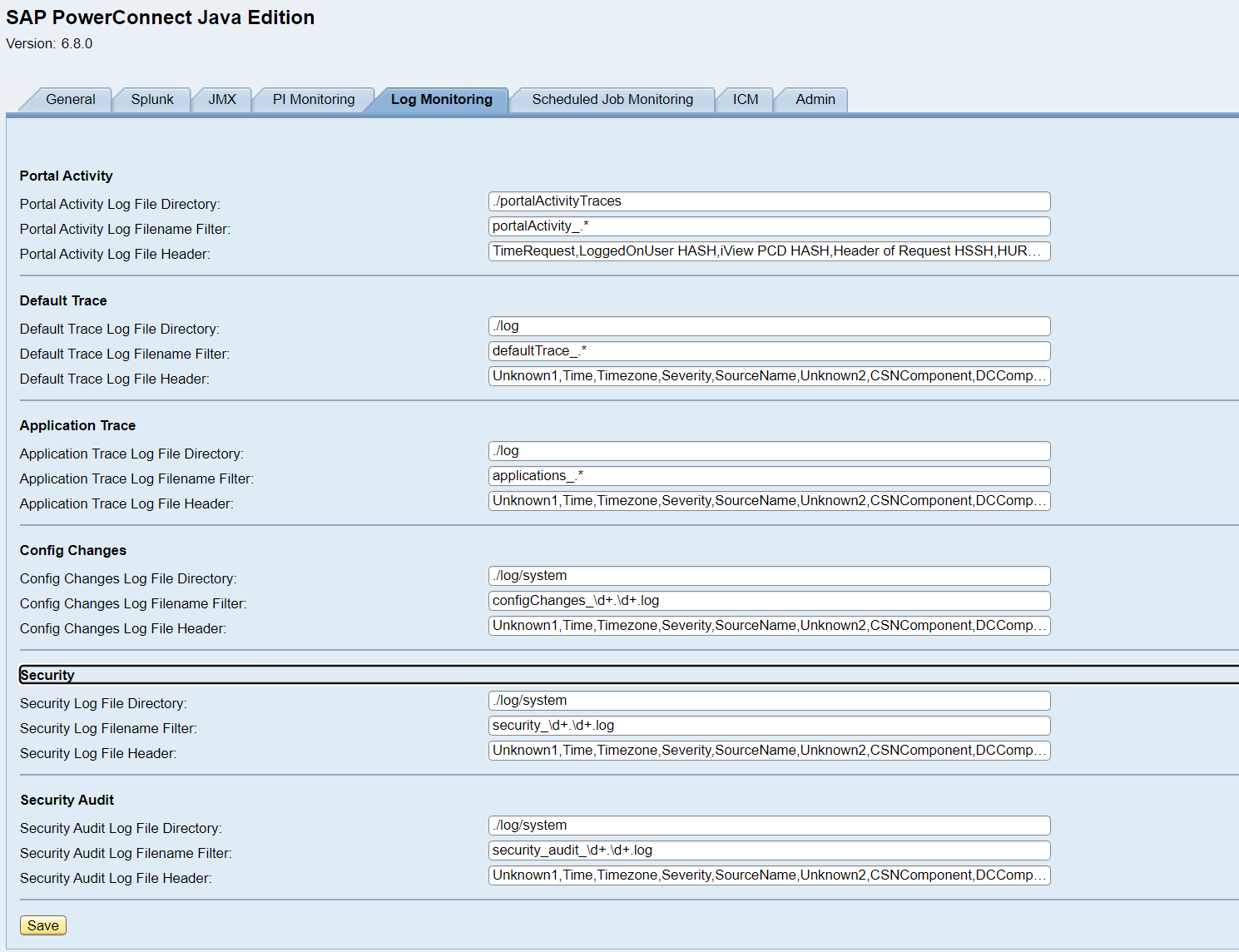
Below is the list of configuration options presented in the Log Monitoring window.
Important: These settings should not be changed without first consulting support.
Name | Description | Restart of PowerConnect Required | Default |
|---|---|---|---|
Portal Activity Log File Directory | Directory on the filesytem where the Portal Activity logs are stored | Yes | ./portalActivityTraces |
Portal Activity Log Filename Filter | Regex pattern matching Portal Activity log filenames | Yes | portalActivity_.* |
Portal Activity Log File Header | Comma separated list of field names which are mapped to each line in the log | Yes | TimeRequest, LoggedOnUser HASH, iView PCD HASH, Header of Request HSSH, HURL Query String HASH, Time to Process Request, ServerNode, TimeToProcessRequest, HTTPSessionID, NavigationPath, ObjectType, ServerHost, UniqueID, URLQueryString |
Default Trace Log File Directory | Directory on the filesytem where the Default Trace logs are stored | Yes | ./log |
Default Trace Log Filename Filter | Regex pattern matching Default Trace log filenames | Yes | defaultTrace_.* |
Default Trace Log File Header | Comma separated list of field names which are mapped to each line in the log | Yes | Unknown1, Time, Timezone, Severity, SourceName, Unknown2, CSNComponent, DCComponent, Unknown3, CorrelationID, Application, Location, User, Session, Transaction, DSRRootContextID, DSRTransaction, DSRConnection, DSRCounter, ThreadName, Unknown4, Unknown5, Text |
Application Log File Directory | Directory on the filesystem where the Application logs are stored | Yes | ./log |
Application Log Filename Filter | Regex pattern matching Application log filenames | Yes | applications_.* |
Application Log File Header | Comma separated list of field names which are mapped to each line in the log | Yes | Unknown1, Time, Timezone, Severity, SourceName, Unknown2, CSNComponent, DCComponent, Unknown3, CorrelationID, Application, Location, User, Session, Transaction, DSRRootContextID, DSRTransaction, DSRConnection, DSRCounter, ThreadName, Unknown4, Unknown5, Text |
Config Changes Log File Directory | Directory on the filesystem where the configuration change logs are stored | Yes | ./log/system |
Config Changes Log Filename Filter | Regex pattern matching Config change log filenames | Yes | configChanges_\d+.\d+.log |
Config Changes Log File Header | Comma separated list of field names which are mapped to each line in the log | Yes | Unknown1,Time,Timezone,Severity,SourceName,Unknown2,CSNComponent,DCComponent,Unknown3,CorrelationID,Application,Location,User,Session,Transaction,DSRRootContextID,DSRTransaction,DSRConnection,DSRCounter,ThreadName,Unknown4,Unknown5,Text |
Security Log File Directory | Directory on the filesystem where the security logs are stored | Yes | ./log/system |
Security Log Filename Filter | Regex pattern matching security log filenames | Yes | security_\d+.\d+.log |
Security Log File Header | Comma separated list of field names which are mapped to each line in the log | Yes | Unknown1,Time,Timezone,Severity,SourceName,Unknown2,CSNComponent,DCComponent,Unknown3,CorrelationID,Application,Location,User,Session,Transaction,DSRRootContextID,DSRTransaction,DSRConnection,DSRCounter,ThreadName,Unknown4,Unknown5,Text |
Security Audit Log File Directory | Directory on the filesystem where the security audit logs are stored | Yes | ./log/system |
Security Audit Log Filename Filter | Regex pattern matching security audit log filenames | Yes | security_audit_\d+.\d+.log |
Security Audit Log File Header | Comma separated list of field names which are mapped to each line in the log | Yes | Unknown1,Time,Timezone,Severity,SourceName,Unknown2,CSNComponent,DCComponent,Unknown3,CorrelationID,Application,Location,User,Session,Transaction,DSRRootContextID,DSRTransaction,DSRConnection,DSRCounter,ThreadName,Unknown4,Unknown5,Text |
A restart of the PowerConnect agent can be completed using the instructions in the following document: Start & Stop PowerConnect Java agent (PowerConnect Java - All Versions) .
Splunk Event
Default Trace Log
The event will look like this in Splunk:
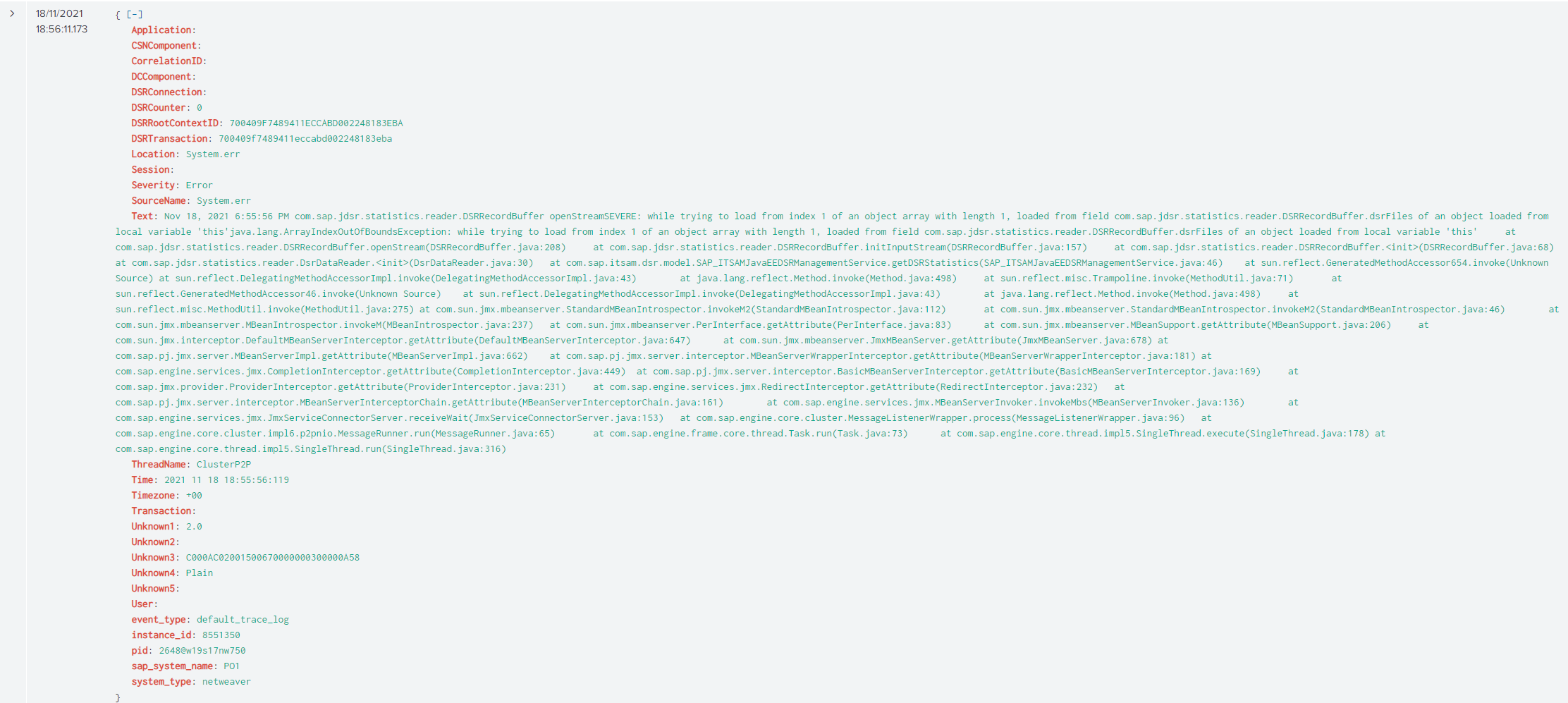
Application Log
The event will look like this in Splunk:
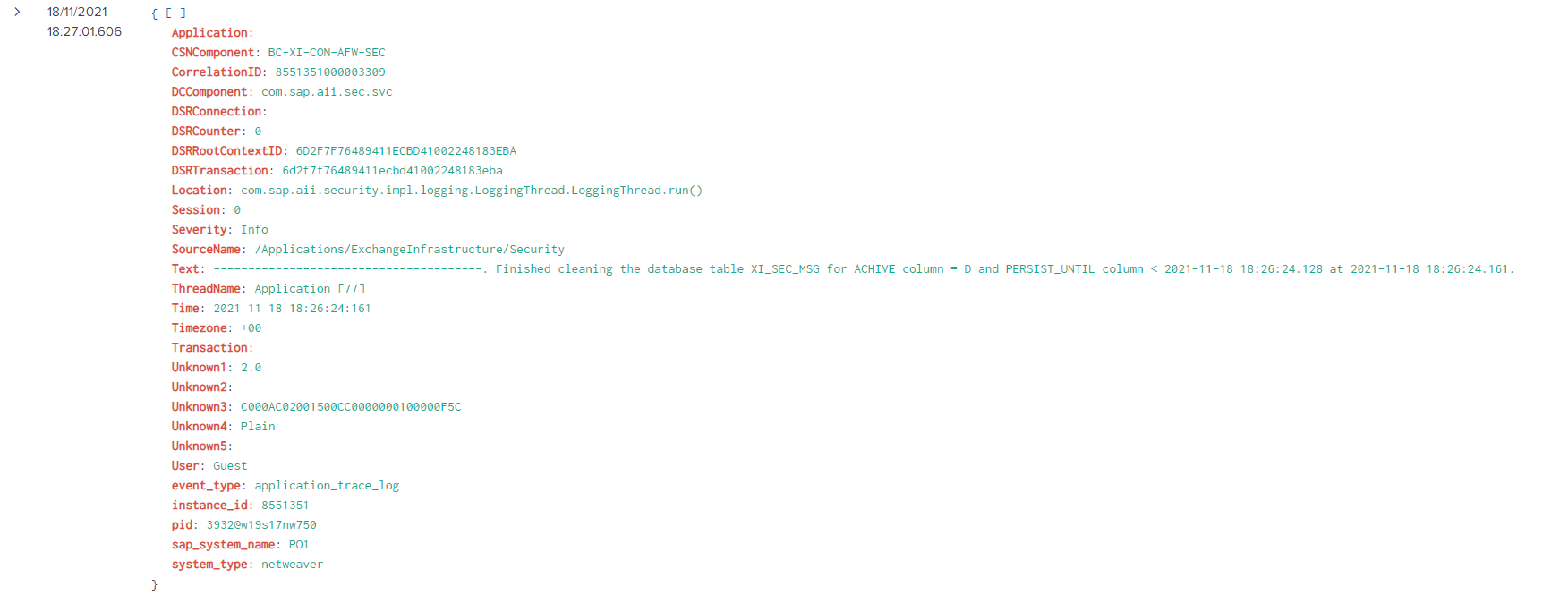
Configuration Changes Log
The event will look like this in Splunk:
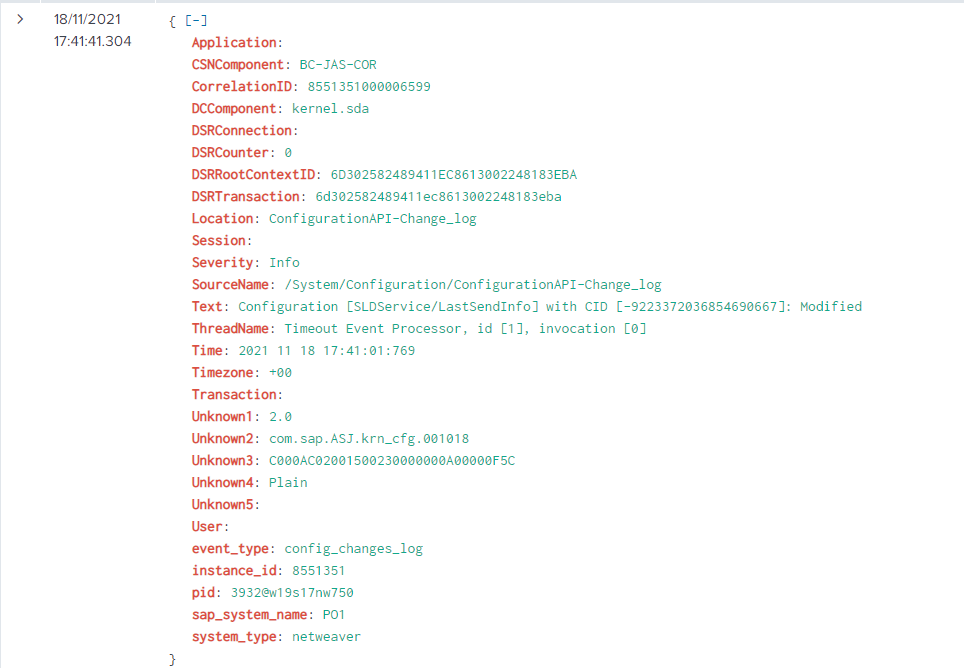
Security Log
The event will look like this in Splunk:
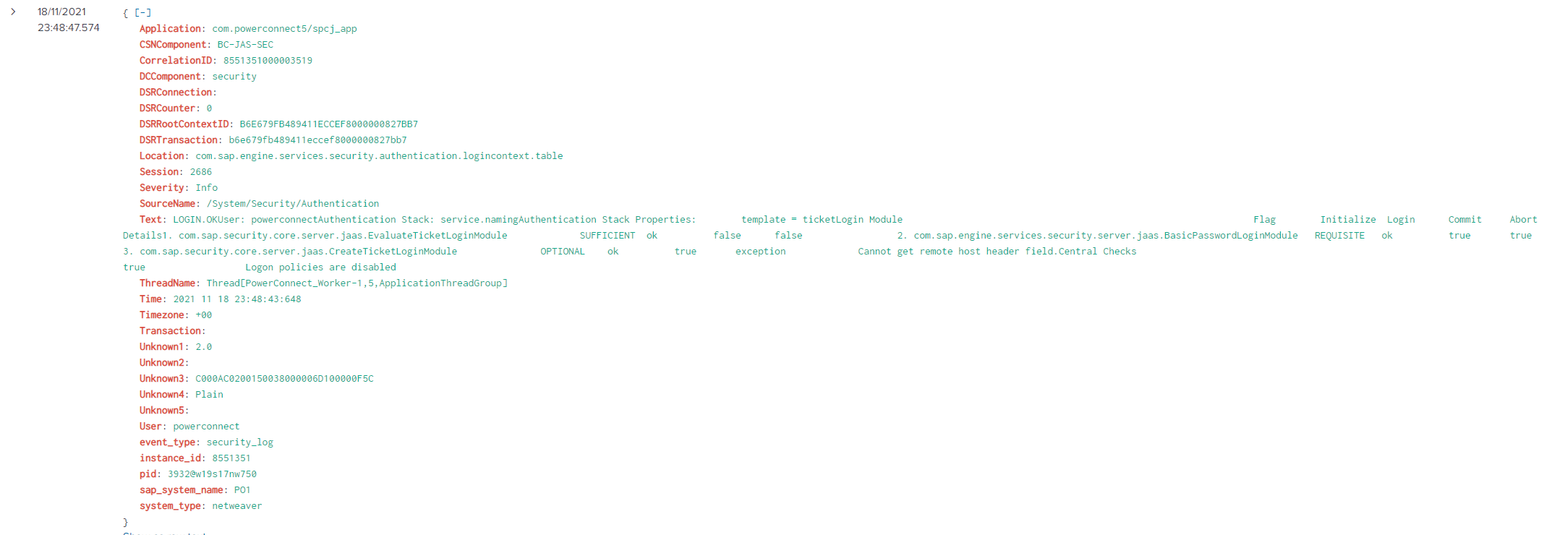
Security Audit Log
The event will look like this in Splunk:

